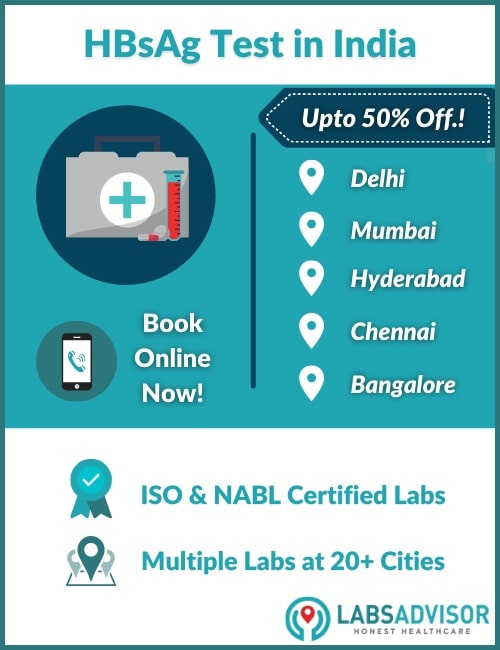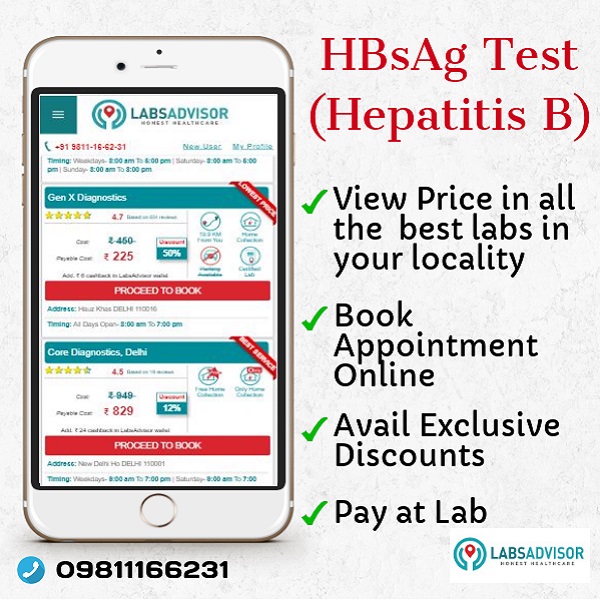
HBsAg or Hepatitis B is known as the most common serious liver infection in the world. It can cause both chronic and acute infections.
Book this really important test at your local top-quality labs through us at up to 50% discount. The lowest HBsAg test cost is ₹100 only.
HBsAg / Hepatitis B Test Through LabsAdvisor
|
Book your HBsAg test online to avail the exclusive offers and cashback!
Here are the simple steps to book your appointment at a discounted price.
- Click on the link given in the below table according to your preferred city.
- Choose the most suitable lab for your HBsAg test.
- Select your preferred date and time for your appointment.
- Enter the patient details and click submit.
- Congratulations! You have booked an appointment at a discounted price.
Book online yourself at any time of the day or night by clicking on the appropriate link in the table below.
Hepatitis B Test Cost in India & Lab Details
We offer the HBsAg test in over 20 Indian cities. Click on the link of your city below to choose a lab and make an online booking for home collection at a suitable time.
| City for HbsAg Test | Price starting from |
| HBsAg Test Cost in Delhi | ₹270 |
| HBsAg Test Cost in Noida | ₹128 |
| HBsAg Test Cost in Gurgaon | ₹225 |
| HBsAg Test Cost in Chennai | ₹410 |
| HBsAg Test Cost in Hyderabad | ₹100 |
| HBsAg Test Cost in Mumbai | ₹283 |
| HBsAg Test Cost in Bangalore | ₹340 |
| HBsAg Test Cost in Pune | ₹378 |
| HBsAg Test Cost in other cities in India | ₹100 |
Frequently Asked Questions About Hepatitis B Test
What is HBsAg or Hepatitis?
The liver is one of the largest glands of the body. Hepatitis is an inflammation of the liver. The inflammation in the liver can either be due to injury or infection to the liver caused by alcohol, drugs, or other medical conditions.
Hepatitis viruses are mainly of five types, referred to as types A, B, C, D, and E. Types A, B, and C are the most common types.
The most common serious liver infection in the world is known as Hepatitis B. It can cause both chronic and acute infections.
Sometimes a lot of people, who get this virus, have it for a short time and then get better. This is called acute hepatitis B.
Sometimes the virus is persistent and causes a long-term infection, called chronic hepatitis B. This chronic infection can damage the liver. It can cause scarring of the organ (liver cirrhosis), liver failure, and cancer.
It can be fatal if it isn’t treated on time. Aside from inflammation of the liver, it also causes a patient to suffer from jaundice, vomiting, and even death.
Younger children are more likely to get chronic hepatitis B that is infected with the virus. This virus is more infectious than HIV because it is very easily transmitted by blood and other body fluids.

What Causes Hepatitis B?
Hepatitis B is an infection in our liver caused by the hepatitis B virus (HBV). The virus can be passed from person to person through blood, other body fluids, and semen.
- Sharing of Syringes: HBV is easily transmitted through syringes and needles contaminated with infected blood.
- Sexual contact: By having unprotected sex with an infected partner whose semen, blood, saliva, or vaginal secretions enter the body.
- Tattoo or acupuncture: Hepatitis B is a concern for someone who gets a tattoo, acupuncture, or piercing with tools that weren’t sterilized or by sharing shaving blades, etc.
- Mother to child: During pregnancy, women infected with HBV can pass the virus to their babies during childbirth. However, newborn babies can be vaccinated to avoid getting infected in almost all cases.
- Sharing personal items: Such as razors, toothbrushes and nail clippers, etc, with a person who has been infected with the virus.
Acute vs. chronic Hepatitis B
Hepatitis B infection may be either long-lasting (Chronic) or short-lived (Acute).
- Acute hepatitis B infection usually lasts less than six months. Our body’s immune system is likely to clear acute hepatitis B from our body, and our body should be able to recover completely within 2-3 months. Most adults who acquire hepatitis B usually have an acute infection, but it can also lead to chronic infection.
- Chronic hepatitis B infection lasts five months or longer. Sometimes the HBV infection may also last a lifetime, when our body’s immune system is unable to fight off the acute infection, possibly leading to serious illnesses such as liver cancer and cirrhosis.
Chronic hepatitis B infection may go undetected for many years until a person becomes seriously ill from liver disease.
What are the Symptoms of Hepatitis B (HBV)?
Many people infected with acute Hepatitis B infection won’t experience any symptoms and will fight off the infection without realizing they had it. However, most of the time they still are able to pass the virus on to others while they’re infected.
Main symptoms may include:
- Loss of appetite.
- Vomiting
- Nausea
- Extreme fatigue
- Fever, which is usually low grade.
- Body aches including joint and muscle pain.
- Abdominal pain (near the liver)
The characteristic symptoms of liver disease appear several days after infection and include:
- Jaundice (yellow-colored skin).
- The white of the eye becomes yellow.
- Dark-colored urine
- Itchiness of skin.
- Stomach upset.
Hepatitis B is very common in India. The overall incidence of reported hepatitis B cases is 2 per 10,000 individuals, but the true incidence may be higher because many cases do not cause symptoms and go undiagnosed and unreported.
How is Hepatitis B Diagnosed?
To screen for hepatitis B virus infection, your doctor will recommend a series of blood tests. These blood tests can show if you have an active Hepatitis B infection and it can also show if you had the virus or infection in the past.
The tests can show different signs of infection:
- Antigens, made by viruses or bacteria.
- Antibodies, made by the body to fight infection.
- Hepatitis B DNA, which is the virus’s genetic material.
The diagnosis of acute hepatitis B generally rests upon the finding of IgM antibody to hepatitis B core (anti-HBc) and hepatitis B surface antigen (HBsAg) and in the serum of a patient with clinical and biochemical evidence of acute hepatitis.
Hepatitis B surface Antigen Test
HBsAg stands for the hepatitis B surface antigen. To test whether you are infected with the hepatitis B virus, one thing the doctor is looking for is HBsAg in the blood. If it is found in the blood, along with other specific antibodies, it means the person has a hepatitis B infection and can spread the virus.
The doctor can determine if a person is infected with the hepatitis B virus, which can be an “acute” or a “chronic” infection if the HBsAg test result is a “positive” or “reactive”.
Few doctors also recommend a series of blood tests called the panel, to help diagnose the condition.
The following tests are done to look for liver damage if you have chronic Hepatitis B:
- Albumin level
- Prothrombin time
- Liver function tests
A doctor also orders a test to measure the level of HBV in your blood (viral load) to know how your treatment is working.
How is Hepatitis B Treated?
The treatment of hepatitis B infection mainly depends on how active is the virus in your body.
Most adults recover fully on their own who are infected with hepatitis B, even if their signs and symptoms are severe. Chronic hepatitis B infection or virus is more likely to develop on children. Chronic hepatitis B can also be treated with Antiviral medications. These can help us to fight the virus and may also reduce the risk of future liver complications.
Hepatitis B vaccine and an injection of HBV immune globulin may help to prevent infection to spread in the body, but there is no cure if you have it.
Maintaining adequate nutrition, taking proper rest, and drinking lots of fluids and are mainly required for curing acute hepatitis B symptoms. Hospitalization may be necessary in severe cases, but this is rare.
Chronic hepatitis B is treatable but is not fully curable. The main aim of the therapy is to reduce the risk of complications, including premature death. The diagnosis and treatment on time can help to prevent liver failure, cirrhosis, and liver cancer by reducing the hepatitis B viral load and the loss of HBeAg (either with or without detection of anti-HBe) while improving liver enzyme levels.
In some cases, if hepatitis B has severely damaged the liver then the patient may need a liver transplant.
The following suggestions might help you cope if you’ve been diagnosed with hepatitis B infection:
- Learn about hepatitis B.Ask your doctor about the disease or read about it on the internet or guides.
- Stay connected to friends and family. If you are infected please don’t cut yourself off from people who can offer support as you can’t spread hepatitis B through casual contact.
- Take care of yourself. By having a healthy and balanced diet full of fiber (fruits and vegetables), exercises done regularly, and by getting enough sleep.
- Take care of your liver. Don’t take prescription or over-the-counter drugs without consulting your doctor. Don’t drink alcohol. Get tested for hepatitis A and C. Even if you haven’t been exposed, get vaccinated for hepatitis A & B.
Can Hepatitis B be Prevented?
The best way to prevent infection is to take the Hepatitis B vaccine. The vaccination is highly recommended these days by doctors. You have to take three vaccines to complete the series. The following groups should receive the Hepatitis B vaccine:
- all infants, at the time of birth
- any children and adolescents who weren’t vaccinated at birth
- adults being treated for a sexually transmitted infection
- HIV-positive individuals
- men who have sex with men
- family members of those with Hepatitis B
- People living in institutional settings
- people whose work brings them into contact with blood
- people with multiple sexual partners
- injection drug users
- individuals with chronic diseases
- people traveling to areas with high rates of Hepatitis B
These days everyone should receive the Hepatitis B vaccine. It’s a very safe vaccine and relatively inexpensive.
There are also many other ways to reduce other risks of HBV infection.
It is always better to ask your sexual partners to get tested for Hepatitis B if any symptoms are there and feel free to discuss the risk of transmitting it to her or him. Every time you have sex, use a new latex condom, but always remember that using a condom can only reduce but it doesn’t eliminate the risk.
Avoid drug use. Always check to see if your destination has a high incidence of Hepatitis B especially if you’re traveling internationally and make sure that you are fully vaccinated prior to travel. Never share needles and syringes. And don’t share your toothbrush and razor blades, which may carry traces of infected blood.
Other topics you may be interested in:-
- CBC Test Cost in India
- Thyroid Function Test Cost in India.
- 3 Tesla MRI Scan Cost in Mumbai
- X Ray Scan Cost in Mumbai







If you want us to call you back, click on the link below